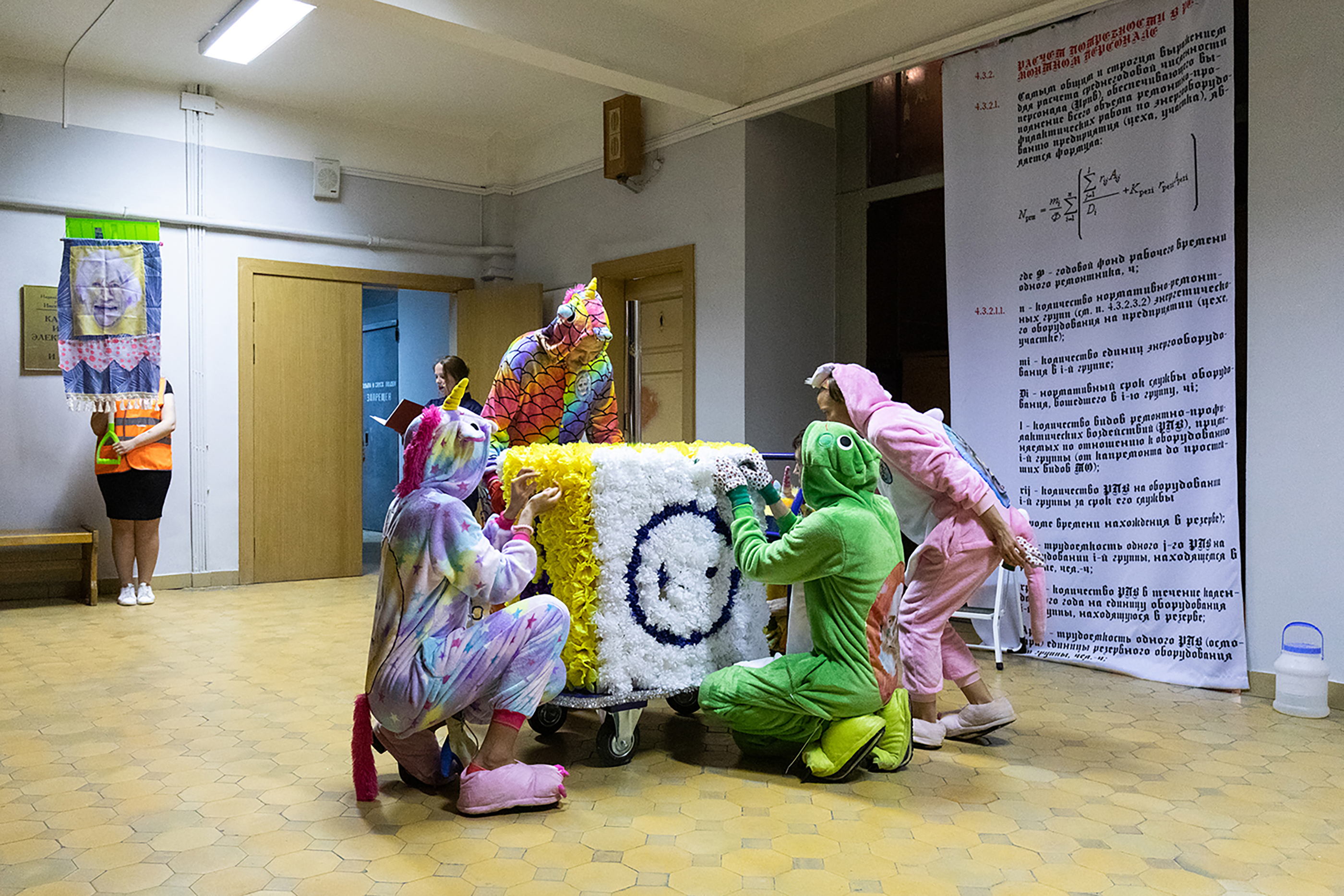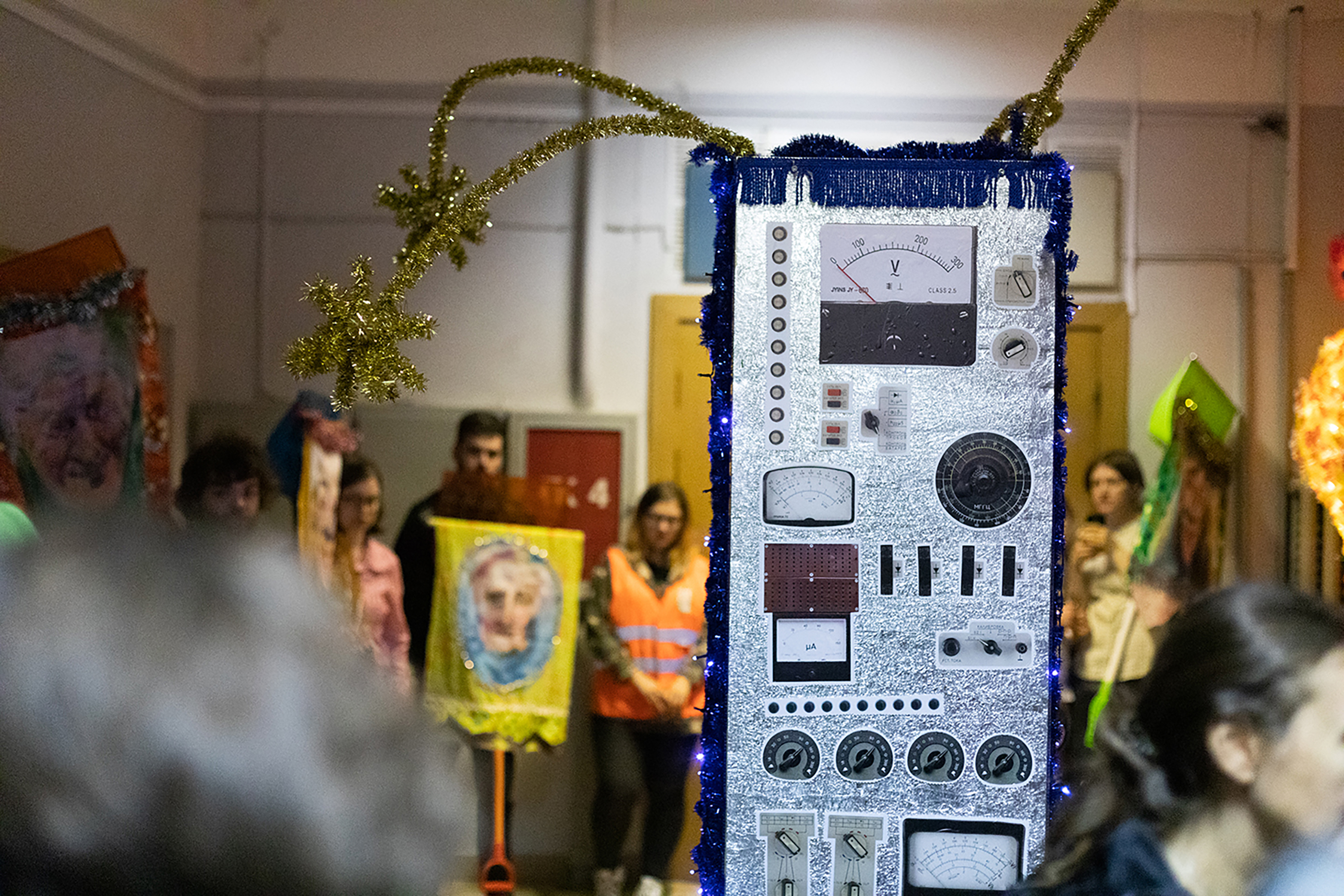GES-2. The Opera
The Continuous Currents project is an attempt to answer the questions posed by the emergence of an art institution on the site of a power plant with a century-long history. Can culture become as necessary for the city as the heat and electricity generated by the hydroelectric power station? How will the process of cultural production have to change in order to do so?

The production is specially designed to be shown in the Institute’s constructivist Laboratory, many of whose graduates have worked at the power station for decades. The dramaturgy is shaped by the architectural elements of the space: a spiraling reinforced concrete ramp that runs through all eight floors of the tower, and continuously moving elevators known as paternosters: their open cabins without doors never stop, so one needs to enter and exit them while they are slowly moving. This principle resembles the passing the rosary from finger to thumb when reading prayers, hence the name (from Lat. “pater noster” — “our father”). For the production, the elevators get to work for the first time in 30 years. Besides the MPEI building, there are only three paternoster lifts in Moscow: in the Gostorg and Centrosoyuz buildings (both on Myasnitskaya Street) and in the building of the Ministry of Agriculture on Sadovo-Spasskaya Street. Only the latter is still in operation.

The libretto is based on an interview with a worker of the former
In addition to the stage version, at a later stage the opera will continue its existence in the
The fact that the power plant on Bolotnaya Embankment will be replaced by a cultural institution is a common occurrence, and there is nothing outrageous about this. But it is very indicative. If 111 years ago the emergence of the power plant opposite the Kremlin symbolized the beginning of a new era (one that came to pass in reality), it is only logical to assume that with the departure of the station this era ends — the era of industrial civilization, remarkable and yet terrifying, like the Hellenistic despotisms or the Roman Empire. So what what replaces cumbersome vertically oriented civilisational constructs? More mobile miniature structures with a slightly pronounced vertical line.
I call the method of turning a document into poetry “poetic verbatim”. With Katya Troepolskaya, we came up with the idea of rearranging the words in the document so that the lines began to rhyme, and the text itself appeared to meet the minimum requirements applicable to poetry: rhythm and rhyme. At the same time, it is important to insert as few of your own words as possible, ideally you should only use the text from an original source, in this case, an employee ofGES-2 . From this simple manipulation of words, the text becomes artistically complex, metaphorical, and evokes emotions — laughter, curiosity.
Crew of the GES-2 Opera
Vsevolod Lisovsky, director, screenwriter, founder of the Transformator.doc project — the experimental venue for Teatr.doc. He was awarded a Golden Mask for the show Akyn Opera (2012) featuring non- professional actors from Tajikistan and Uzbekistan.
Dmitry Vlasik, composer, performer, author of sound performances and music for theatrical projects. A soloist of Moscow Philarmonic Orchestra, a member of the Moscow Ensemble of Contemporary Music. He is the author of the music to shows by Andrey Stadnikov, Elena Gremina, Dmitry Volkostrelov, Kirill Serebrennikov, Marata Gatsalov.
Andrei Rodionov, poet, playwright and screenwriter. The curator of the All-Russian Poetry Slam tournaments, as well as several literary festivals. Amongst his latest collections is Poetic Diary, Started on the Day when Yuri Mamleev Died, 25 October 2015 (2018). He was shortlisted for the Andrey Bely Prize (2005), award winner of the Triumph prize (2006) and the Grigorievsky prize (2013).
Irina Korina, artist and set designer. Award winner of Soratnik (2006, 2009, 2012) and Innovation (2008, 2015) prizes. A participant in the Venice Biennale (2009, 2017). As art director she has worked on films by Ilya Khotinenko, Mikhail Mestetsky and Alexander Shein.